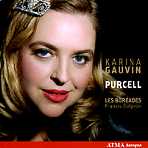Successful Purcell singing is mostly about style. Yes, you need solid, highly refined technique–and a beautiful voice doesn’t hurt either; but Purcell is not Handel. His arias and other theatrical solo works are more on the order of glorified song than florid, super-virtuoso tour-de-force. Purcell also was a composer very much of his time–certainly not a bad thing for him!–and therefore wrote a great deal of music that today seems more quaint than profound, more mannered than meaningful. The poetic language, artfully and ingeniously set as it is, sometimes is more charming than seriously engaging. However, when Purcell is on–as in his music for Dido and Aeneas, The Fairy Queen, and King Arthur–charming turns to compelling, quaintness gives way to captivating brilliance, embodied in some very fine tunes.
This collection puts some of the best Purcell on display–and it couldn’t have a more musical or vocally accomplished advocate than Canadian soprano Karina Gauvin. Her voice is pretty for sure, but it also has richness and substance, not to mention a most endearing vibrato that adds an earnestness and enlivening tension to everything she sings. Her dramatic instincts are invariably right (check out the finely-wrought characterization in the extended scene from Don Quixote, “From rosy bowers”), and these selections show just how versatile of mood and character she can be, equally adept at the sweetly pronounced sentiment of “Fairest Isle” and ardently-felt torment of love in “If Love’s a sweet passion” as she is in the urgent warnings of “Hither this way” or the energetic dance of “Strike the viol”, the latter a truly impressive display of Baroque singing style and subtle expressive technique. And speaking of impressive: her rendition of the beloved “When I am laid in earth” from Dido and Aeneas is a masterpiece, nearly as heartbreakingly affecting as Janet Baker’s classic 1961 performance (Decca).
The orchestra Les Boréades is a world-class partner, serving both as sensitively-attuned accompanist and “solo” performer in its own right, offering several scintillating instrumental selections, including an Air, Chaconne, Hornpipe, and Trumpet Tune from King Arthur and several numbers from The Fairy Queen. It would be impossible to name just a few highlights–Gauvin’s singing is consistently intelligent, purposeful, and musically compelling; however on the instrumental side, I might give special mention to the ensemble’s lovely, colorful, rhythmically infectious “Strike the viol” and to Sylvain Bergeron’s artful theorbo and guitar accompaniments throughout. But no matter how you add it up, this is one exciting and rewarding hour of Purcell, ideally recorded and thoughtfully packaged–and Gauvin is a treasure. [11/2/2006]
































